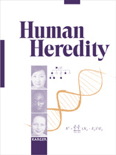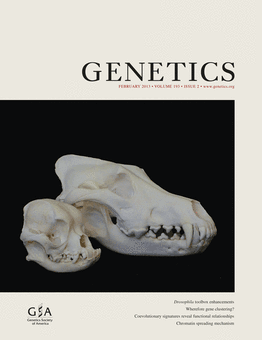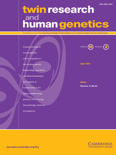
HUMAN HEREDITY
Scope & Guideline
Charting the Course of Human Genetic Research
Introduction
Aims and Scopes
- Genetic Epidemiology:
The journal emphasizes studies that investigate the distribution and determinants of genetic variation in human populations, including the role of genetics in disease prevalence and risk. - Mendelian Randomization:
Research utilizing Mendelian randomization to infer causal relationships between genetic variants and health outcomes is a primary focus, helping to establish the directionality of associations. - Polygenic Risk Scores:
The development and application of polygenic risk scores to predict individual susceptibility to diseases based on genetic makeup are key areas of exploration. - Gene-Environment Interactions:
Studies assessing how environmental factors interact with genetic predispositions to influence health outcomes are prominently featured. - Genetic Variants and Rare Diseases:
The journal publishes research identifying novel genetic variants associated with rare diseases, contributing to the understanding of their etiology. - Population Genetics and Ancestry:
Research that explores genetic diversity across populations and its implications for health, including studies on admixture and population structure, is a significant component. - Bioinformatics and Statistical Genetics:
The journal includes methodological advancements in bioinformatics and statistical approaches for analyzing genetic data, enhancing the understanding of genetic architectures.
Trending and Emerging
- Integration of Multi-Omics Data:
There is a growing trend towards integrating multi-omics approaches (genomics, transcriptomics, proteomics) to provide a more comprehensive understanding of complex traits and diseases. - Machine Learning and AI in Genetics:
The application of machine learning and artificial intelligence methodologies for genetic data analysis is on the rise, enhancing predictive capabilities and uncovering hidden patterns. - Focus on Comorbidities and Multi-Trait Analyses:
Research exploring the genetic underpinnings of comorbid conditions and using multi-trait analyses to identify shared genetic architecture is increasingly prominent. - Environmental Influences on Genetic Expression:
There is an emerging focus on how environmental factors influence gene expression and contribute to complex diseases, reflecting a holistic view of genetics. - Ethnic and Ancestral Diversity in Genetic Studies:
The importance of studying diverse populations to understand genetic variation and disease susceptibility is gaining traction, as researchers aim to address health disparities. - Functional Genomics and Pathway Analysis:
Research that delves into the functional implications of genetic variants through pathway analysis and gene networks is becoming more significant, emphasizing the biological context of genetic findings.
Declining or Waning
- Single-Locus Studies:
There is a noticeable decline in studies focusing solely on single genetic loci, as the field moves towards more integrative approaches that consider polygenic and multifactorial influences. - Traditional Genetic Association Studies:
The prevalence of traditional case-control association studies is decreasing, replaced by more sophisticated methodologies such as multi-phenotype analyses and Mendelian randomization. - Focus on Rare Variants Without Functional Context:
Research that identifies rare variants without exploring their functional implications or biological pathways is becoming less common, as there is a shift towards understanding the biological relevance of findings. - Static Genetic Models:
Static models that do not account for dynamic changes in genetic expression or environmental interactions are less frequently reported, as researchers seek more nuanced models.
Similar Journals

Frontiers in Genetics
Unlocking the Secrets of Genetics for AllFrontiers in Genetics is a premier academic journal dedicated to advancing the field of genetics through high-quality, peer-reviewed research. Published by FRONTIERS MEDIA SA in Switzerland since 2010, this Open Access journal provides a platform for researchers and practitioners to disseminate innovative findings across various subfields, including clinical genetics and molecular medicine. With a notable emphasis on interdisciplinary approaches, the journal holds a strong position in the academic landscape, achieving Q2 rankings in key categories such as Genetics and Molecular Medicine in 2023. Not only does Frontiers in Genetics contribute to the scholarly dialogue by publishing impactful studies, but it also promotes accessibility to vital research, ensuring that knowledge is available to a global audience. This journal is a vital resource for researchers, professionals, and students looking to stay at the forefront of genetic discoveries and their applications, reflective of its engagement with contemporary challenges in genetics and healthcare.

Human Genetics and Genomics Advances
Catalyzing Breakthroughs in Genomic ScienceHuman Genetics and Genomics Advances is a premier academic journal published by Elsevier, dedicated to the field of human genetics and genomic medicine. With an ISSN of 2666-2477, this journal has quickly established itself as a leading platform for disseminating cutting-edge research from its inception in 2020. Featured prominently in Q1 categories for both Clinical Genetics and Molecular Medicine as of 2023, it ranks favorably among its peers, reflected in its Scopus rankings. The journal not only offers valuable insights into the latest advancements and applications in genetics but also facilitates open dialogue among researchers, clinicians, and students. As an open access publication, it ensures that groundbreaking findings in genetics are readily accessible to a global audience, promoting knowledge sharing and collaboration. Human Genetics and Genomics Advances continues to be instrumental in moving the field forward, providing a vital resource for those at the forefront of genetic and genomic research.

ANNALS OF HUMAN BIOLOGY
Pioneering Research in Human Biology and Health SciencesANNALS OF HUMAN BIOLOGY is a distinguished academic journal published by Taylor & Francis Ltd that focuses on the intersection of human biology and health sciences. With an ISSN of 0301-4460 and an E-ISSN of 1464-5033, this journal has been a pivotal resource for researchers and practitioners since its inception in 1974. Covering critical domains such as Aging, Epidemiology, Genetics, Physiology, and Public Health, it exemplifies an interdisciplinary approach that enhances our understanding of human biological variation and its implications for health and disease. While it currently does not offer Open Access, the journal maintains a respectable standing in its field with notable rankings in Scopus, reflecting its contributions to scientific knowledge. Its commitment to high-quality research and comprehensive review makes it an essential platform for scholars, healthcare professionals, and students seeking to explore the biological underpinnings of human health.

GENETIC EPIDEMIOLOGY
Advancing the Science of Genetic HealthGENETIC EPIDEMIOLOGY is a pioneering journal published by Wiley that bridges the fields of genetics and epidemiology to advance our understanding of the genetic underpinnings of health and disease. Established in 1984 and converging into its 40th year of impactful research in 2024, this journal offers a key platform for the dissemination of innovative research findings, statistical methods, and applications in both clinical genetics and epidemiological practices. With a robust presence in Scopus, ranking in the second quartile (Q2) for both epidemiology and clinical genetics, it enjoys a significant reputation among its peers. The journal does not currently offer open access, but it is vital for researchers, professionals, and students committed to exploring the evolving landscape of genetic influences on population health. Its rich repository of studies not only enhances knowledge but also informs public health policies and clinical practices worldwide, making it an indispensable resource for those seeking to innovate and apply genetic research in the quest for better health outcomes.

Genetics Research
Exploring the Frontiers of Genetic DiscoveryGenetics Research, published by HINDAWI LTD, is a distinguished open access journal that has been at the forefront of genetic studies since its inception in 1960. With the transition to open access in 2019, this journal has expanded its accessibility, fostering knowledge dissemination across the global scientific community. Operating out of the United Kingdom, it provides a platform for innovative research in the fields of genetics and molecular biology, encompassing a broad range of topics that are highly relevant to medical sciences. As of 2023, it holds a Q4 classification in Genetics and a Q3 classification in miscellaneous Medicine, reflecting its ongoing commitment to scholarly excellence amidst shifting academic landscapes. While the journal's H-index remains unlisted, its indexed ranking within Scopus, with a rank of #325/328 in the Genetics category highlights the challenges ligated to its niche audience. Nevertheless, it serves as a crucial resource for researchers, professionals, and students eager to contribute to and stay informed on the latest genetic research trends and breakthroughs.

EUROPEAN JOURNAL OF HUMAN GENETICS
Connecting Researchers in the Field of Human GeneticsThe EUROPEAN JOURNAL OF HUMAN GENETICS, published by SpringerNature, stands as a preeminent platform in the field of genetics and clinical genetics. Established in 1993, this prestigious journal, with an ISSN of 1018-4813 and an E-ISSN of 1476-5438, has consistently maintained its position in the Q1 quartile for both Genetics and Clinical Genetics categories as of 2023, reflecting its significant contributions to the field. Its impact is further underscored by its impressive Scopus rankings, placing it in the 92nd percentile among clinical genetics journals. The journal aims to disseminate cutting-edge research, case studies, and reviews that advance our understanding of human genetics, promoting collaboration and innovation among researchers, professionals, and students alike. While it does not currently offer open access, the journal provides substantial value through its rigorous peer review process and commitment to quality. As it continues to shape the future of genetic research through 2024 and beyond, the EUROPEAN JOURNAL OF HUMAN GENETICS remains an essential resource for those dedicated to exploring the complexities of human heredity.

NATURE GENETICS
Driving Breakthroughs in Genetic ResearchNature Genetics is a premier journal in the field of genetics published by NATURE PORTFOLIO, renowned for its impactful research and significant contributions to the understanding of genetic mechanisms and their implications for human health. Since its establishment in 1992, the journal has continually maintained a strong reputation, evidenced by its impressive Q1 ranking in the Genetics category and a commendable Scopus ranking of #4 out of 347 in Genetics, placing it in the 98th percentile. Although it does not currently offer Open Access options, Nature Genetics remains a critical resource for researchers and practitioners, providing cutting-edge studies and papers that drive advancements in both fundamental and applied genetic research. With a global readership and contributions from leading scientists around the world, this journal is a vital platform for disseminating innovative findings and fostering discussions at the frontier of genetics.

GENETICS
Unlocking the Secrets of Heredity and EvolutionGENETICS, published by the Genetics Society of America, stands as a preeminent journal in the field of genetics, with a keen focus on advancing the understanding of genetic principles and their implications across various biological systems. Since its inception in 1945, the journal has played a pivotal role in disseminating groundbreaking research, maintaining a Q1 ranking in the genetics category as of 2023, positioning it among the top tier of academic publications. While access to the journal is not open, it continues to attract a global readership of researchers, professionals, and students eager to engage with high-quality, peer-reviewed articles that span both classical and contemporary genetics. With its publication history covering critical decades from 1945 to 2024, GENETICS is not just a repository of scientific knowledge but a vibrant forum for the exchange of ideas that drive the field forward. The journal’s commitment to excellence is demonstrated by its strategic coverage of pertinent topics, assuring its relevance for future generations of scholars.

Twin Research and Human Genetics
Bridging Twin Studies and Genetics for a Healthier TomorrowTwin Research and Human Genetics, published by Cambridge University Press, is a leading academic journal that focuses on the vital intersections of genetics, human development, and twin studies. With an ISSN of 1832-4274 and E-ISSN 1839-2628, this journal serves as a critical resource for researchers, healthcare professionals, and students interested in advancing their understanding of genetic influences on human health and behavior. In its dedication to disseminating high-quality research, Twin Research and Human Genetics holds impressive category quartile rankings, including Q2 in Pediatrics, Perinatology, and Child Health, and Q3 in both Genetics (Clinical) and Obstetrics and Gynecology as of 2023. The journal has a converged publication timeline from 2005 to 2024, providing a longstanding platform for rigorous scientific inquiry and discussion in its specialized fields. As an open-access title, it fosters accessibility to vital findings and promotes collaboration among scholars worldwide, ensuring that groundbreaking research reaches a broader audience. Positioned within a challenging and competitive landscape, this journal stands out for its commitment to excellence and its pivotal role in shaping the future of genetic research and its implications for health across the lifespan.

JOURNAL OF HUMAN GENETICS
Transforming Discoveries into SolutionsWelcome to the Journal of Human Genetics, a premier publication in the field of human genetics, published by SpringerNature. With a commitment to sharing groundbreaking research, this journal has been at the forefront of genetic studies since its establishment in 1961, converging its focus in 1996 and continuing to evolve through 2024. It holds a respected Q2 ranking in both the Genetics and Clinical Genetics categories, reflecting its significant contribution to the scientific community. With a notable Scopus ranking of 23rd out of 99 in Clinical Genetics and 95th out of 347 in Genetics, the journal offers a platform for high-impact research that informs clinical practices and advances the understanding of genetic disorders. Operating under an open-access model, it ensures that findings are readily accessible to researchers, professionals, and students worldwide. Join us in exploring the complexities of human genetics and contribute to the ongoing discourse in this dynamic field.